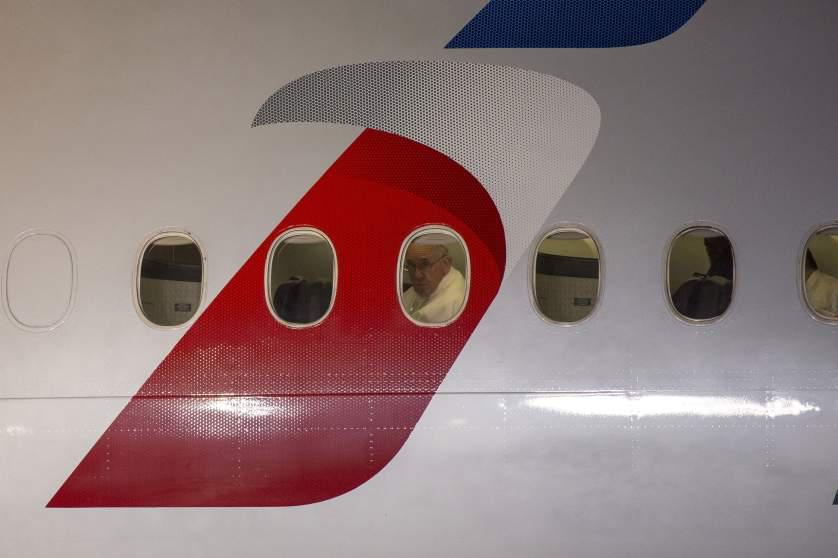|
What Pope Francis Thought of the United States
By Elizabeth Dias
[with video] The Pontiff touched on sexual abuse, women priests and peace in Colombia Pope Francis offered his first review of the U.S. at 39,000 feet late Sunday night. Less than an hour after departing Philadelphia, he concluded his nine-day trip to Cuba and the U.S. with a wide-ranging, in-flight press conference that touched on everything from religious liberty debates in the U.S. to the popularity of the American nuns to his own increasing stardom. He addressed journalists for nearly 60 minutes in Italian and Spanish. Each U.S. city was different, the pontiff said, but the warmth of the country made an impression during his first-ever visit. Washington was very welcoming, but “more formal.” New York, was “stralimitate,” an Italian-Spanish mash-up that evokes overwhelming, exuberant, beyond the limits. Philadelphia was “very demonstrative.” Overall, Pope Francis said he was struck by the piety of the American people. “The church’s challenge is staying close to the people … not being a detached church,” he said. “This is something that the church in America has understood and understood well.” Pope Francis also underscored that conscientious objection is a human right. He was asked if he supported individuals — including government officials — who say they cannot in good conscience abide by some laws or discharge their duties, for example when issuing marriage licenses to same sex couples. “I can’t have in mind all cases that can exist about conscience objection but yes, I can say [that] conscientious objection is a right that is a part of every human right,” he said. “If a person does not allow others to be a conscientious objector, he denies a right. … Conscientious objection must enter into every judicial structure … Otherwise we would end up in a situation where we select what is a right, saying ‘this right that has merit, this one does not.’” One of the most poignant moments came when Pope Francis spoke about a mother who cannot forgive her daughter’s sexual abuser. The Lord still welcomes her, Francis said, even if she cannot forgive. “I understand that woman,” he said. “And God who is even better than me understands her. And I’m sure that that woman has been received by God. … I don’t judge someone who can’t forgive.” He also directly acknowledged that the ugliness of the priestly cover-up of sexual abuse, in addition to the ugliness of the abuse itself. “Those who covered this up are guilty. Even some bishops who covered this up,” he said. “It is a terrible thing.” The popularity of American nuns also made an impression on him. An important person within the U.S. government, Francis said, said that his or her education was owed “above all” to the sisters. Women priests were still not a possibility, Francis reiterated, but not because women don’t have the capacity. “The people of the United States love the sisters,” Francis said, smiling. “I don’t know how much they may love the priests, but they love the sisters, they love them so much. They are great women.” Hinting at the agenda for the upcoming October Synod of the Bishops on the family, Pope Francis emphasized that churches need to better prepare couples for marriage. To become a priest, he said, the required preparation is eight years. Marriage is for life, but by comparison there is not enough preparation. He responded to criticism of his recent streamlining of the annulment process, and said that it closed the door to divorce. Marriage is indissoluble, he said, and the church will not revoke that doctrine. (All the allowable reasons for an annulment are available on the internet, he joked.) On foreign policy, Pope Francis again expressed the Vatican’s commitment to a peace deal in Colombia. He declined to comment on the recent French bombing of Syrian bases belonging to the Islamic State of Iraq and Greater Syria (ISIS). He touched on the migrant crisis in Europe — “the greatest refugee crisis since the last World War” — and again urged dialogue as the way to achieve a solution. Africa, he added, has been an “exploited continent” — first for slaves, then for resources, and now wars have economic interests behind them. He also reiterated his desire to visit China. To be friends with a country like China, he said, would be “joy” and a chance to do good. “I hope there is a possibility to have good relations,” he said. “China is a great nation which brings a great culture to the world.” Asked about his stardom in the U.S., Pope Francis demurred. The Pope must be the servant of the servants of God, he said, quoting a traditional papal title. And, in a very personal moment, Pope Francis gave a window into his own reflection upon leaving the country. “This is a bit a personal but I have to be sincere,” he shared. “When the plane leaves after a visit, I see the faces of so many people. I get the urge to pray for them and say to the Lord, ‘I came here to do something, to do good, perhaps I have done wrong, forgive me but protect all those people who saw me, who thought of what I said, who heard me, even those who have criticized me, all of them.’ That is what I feel.”
|
.
Any original material on these pages is copyright © BishopAccountability.org 2004. Reproduce freely with attribution.
